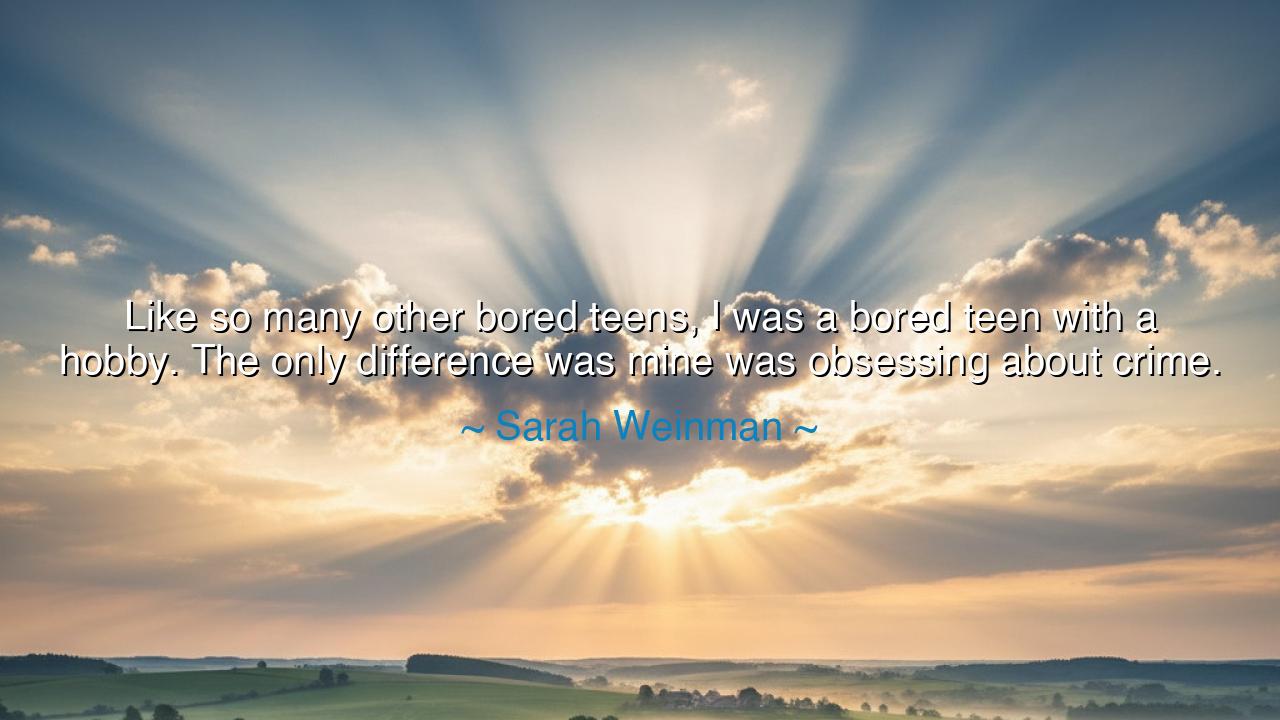
Like so many other bored teens, I was a bored teen with a hobby.
Like so many other bored teens, I was a bored teen with a hobby. The only difference was mine was obsessing about crime.






When Sarah Weinman confessed, “Like so many other bored teens, I was a bored teen with a hobby. The only difference was mine was obsessing about crime,” she revealed not only a personal quirk of her youth, but a profound truth about the nature of curiosity, passion, and the shaping of destiny. Boredom is often seen as a curse, a void of the spirit. Yet in truth, boredom is fertile ground; it is the silence in which obsession, discovery, and calling are born. For in the restless stillness of her teen years, Weinman did not turn to aimless distraction, but to a fascination that would one day shape her voice, her work, and her purpose.
The origin of this quote lies in the universal restlessness of adolescence. The teen years are an age of awakening: the body grows restless, the mind hungers for meaning, and yet the world does not always open its doors to the young. Many turn to fleeting hobbies, to music, games, or idle wandering. Weinman, however, turned her gaze to the shadows of human nature, to the study of crime, where morality, psychology, and society meet in their most intense forms. It was not a pastime of frivolity but of inquiry, for to examine crime is to examine the edges of human possibility, both dark and illuminating.
Consider the story of young Thomas Edison, who, as a restless boy, was expelled from school for being “unruly” and “slow.” His boredom with formal lessons led him instead to endless experiments, burning and breaking, learning through failure. What seemed like rebellion became the soil of genius. So too with Weinman: what others might have dismissed as a peculiar teenage obsession became the seed of her career in crime writing, journalism, and cultural analysis. What begins in boredom may, if pursued with passion, bloom into greatness.
The power of obsession is what separates the ordinary hobbyist from the future master. Many youths dabble; few commit. Weinman’s admission shows that even in her earliest years she did not treat her interest lightly. To obsess is to devote oneself fully, to chase every lead, to study every detail, to let the mind burn with a single fire. And history shows us that those who dare to obsess—whether in art, science, or thought—are those who reshape the world. Obsession, when disciplined, is the crucible of mastery.
Her words also remind us that the path of purpose is not always noble in appearance. To admit fascination with crime may seem morbid to some, but it is also profoundly human. For to understand crime is to understand justice; to confront evil is to sharpen one’s sense of good. The philosopher Dostoevsky wrote of murderers and convicts not to glorify them, but to wrestle with the darkest corners of the soul. Weinman’s hobby as a teen, unusual though it may have seemed, was in truth a training ground for empathy, insight, and truth-telling.
The lesson is thus: do not despise your obsessions. What seems strange or trivial to others may be the very fire that lights your path. Do not fear the intensity of your own curiosity, even if it sets you apart. The world’s greatest thinkers, inventors, and storytellers were once misunderstood youths, lost in their fixations. If your passion is honest, if your interest compels you deeply, then pursue it with courage. For hidden within it may lie your destiny.
Practical wisdom follows. To the young: honor your hobbies, especially those that stir you beyond the surface. To parents and teachers: do not mock or dismiss the odd passions of the restless teen, for within them may lie the roots of a future calling. And to all: embrace the boredom that life brings, for boredom is not emptiness but invitation—the doorway to discovery.
Thus Sarah Weinman’s words, born from the restlessness of adolescence, stand as a teaching for all generations. Boredom, hobby, obsession—these are not trifles but forces that shape who we become. What matters is not that we are restless, but what we do with that restlessness. And those who dare to follow their strange obsessions may one day awaken to find that what once set them apart has become the very thing that defines their greatness.






AAdministratorAdministrator
Welcome, honored guests. Please leave a comment, we will respond soon